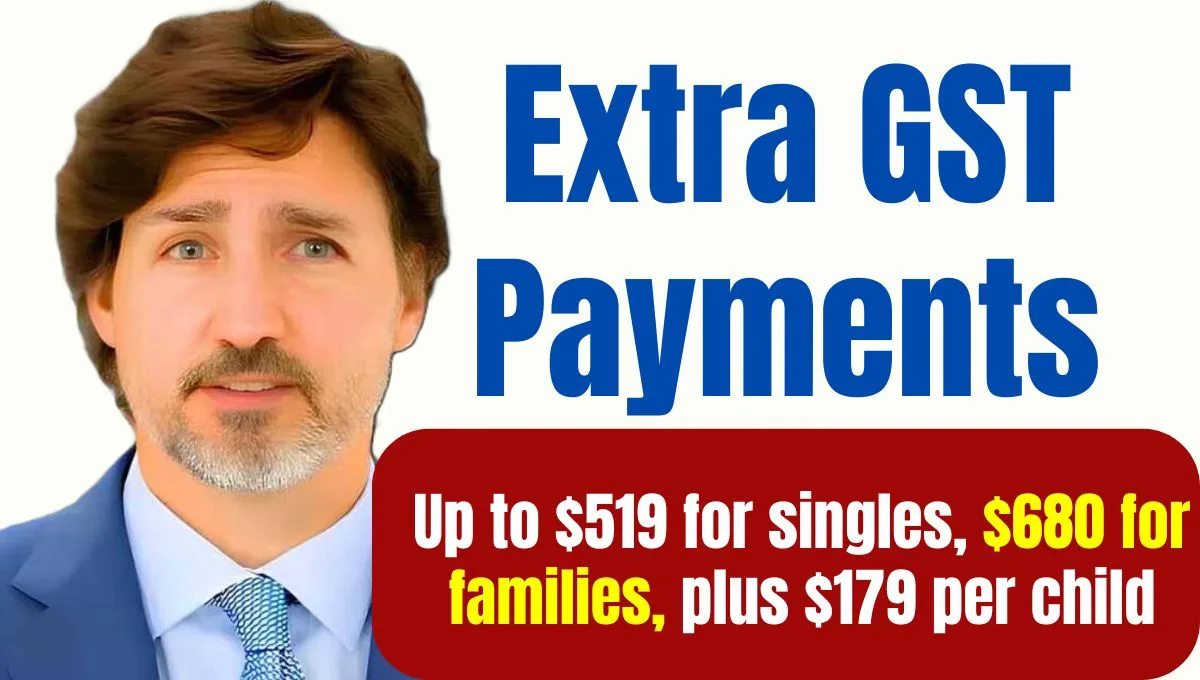Extra GST Payments 2025: Canadians can look forward to positive developments as the government plans to introduce additional GST Payments in 2025, aimed at providing essential financial assistance to individuals and families. This initiative extends beyond the standard GST credit, offering extra support specifically to those with low to moderate incomes who may be experiencing economic difficulties.
Eligible Canadians will soon receive their first benefits of the New Year, with the federal government distributing goods and services tax (GST) or harmonized sales tax (HST) credits. These tax-exempt quarterly payments are intended to alleviate the burden of GST or HST on various goods and services. Furthermore, the credit amounts may also encompass contributions from provincial and territorial programs.

Extra GST Payments 2025
This initiative coincides with a two-month “tax holiday” declared by the federal government, during which Canadians are exempt from paying GST/HST on numerous items. The GST/HST Credit serves as a tax-free quarterly payment designed to assist Canadians with modest incomes in managing the taxes they incur on goods and services.
The next scheduled payment is on April 4, 2025, and this guide provides detailed information on eligibility, application procedures, payment amounts, and strategies to optimize benefits.
Canada Next Extra GST Payment 2025: Check Eligibility, Payment Schedule
Additionally GST Payments 2025
| Topic | Details |
| Payment Program Name | Extra GST Payments |
| Eligibility Criteria | Canadian resident filed 2023 tax return, meets income thresholds |
| Payment Amount | Up to $519 for singles, $680 for families, plus $179 per child |
| Payment Dates | January 3, April 4, July 4, October 3, 2025 |
| Claim Process | Automatic through CRA based on tax return |
| Official Resource | CRA GST/HST Credit |
| Eligibility Criteria | Canadian residents aged 19 or older, or those with a spouse/common-law partner or a parent living with their child; based on 2023 tax return |
| Maximum Annual Amounts | $519 for single individuals; $680 for married or common-law couples; $179 for each child under 19 |
| Application Process | Automatic assessment upon filing income tax return; newcomers must submit Form RC151 |
| Official Resource | Canada Revenue Agency – GST/HST Credit |
What is the GST/HST Credit?
GST/HST Credit is a federal initiative managed by the Canada Revenue Agency (CRA) aimed at providing financial assistance to individuals and families. It helps to reduce some GST/HST costs for everyday purchases. Qualified Canadian people receive payment quarterly, which helps with better domestic budget management.
This tax -free quarterly payment is specially designed to replace goods and service fees (GST) or harmonized turnover tax (HST) for those who achieve qualifications. In 2025, the government planned to increase the program by starting additional payments to support financial stability for qualified individual and families, especially relevant during financial uncertainty.
Eligibility criteria for claiming the Extra GST Payments
To be eligible for the Extra GST Payments, you must fulfill the following requirements:
- Residency: You need to be a resident of Canada for income tax purposes at the time of assessment.
- Age: Be 19 years of age or older.
- Have a spouse or common-law partner.
- Be a parent living with your child.
- Income Limits: Your adjusted family net income must be below the limits set by the Canada Revenue Agency (CRA), which vary depending on your marital status and number of dependents.
- Tax Filing: To qualify for the GST credit and additional payment, it is necessary to file your 2023 tax return, even if you have no income. The CRA will determine your eligibility and payment amount using the information on your tax return.
GST PAYMENT AMOUNT
- The calculation of GST/HST credit payments for 2025 is influenced by factors such as marital status, adjusted family net income, and the number of registered children under 19 for the Canada Child Benefit, as outlined by the Canada Revenue Agency.
- The payment in April is estimated to be about 25% of the total annual entitlement based on the individual’s 2023 tax return.
- For married couples or common-law partners without children, the maximum annual payment is set at $680.
- Parents can claim up to $179 in GST/HST credit for each child under 19, contributing to their overall entitlement.
- The maximum annual amounts for the GST/HST Credit are $519 for single individuals, $680 for married or common-law couples and $179 for each child under 19, distributed across four quarterly payments.
Canada’s Income Tax Brackets in 2025: Check the Maximum Tax Due & Procedure to Submit Your Tax
Canada minimum wage increase Again in 2025 | Check Amount & Province Wise Increase
Next GST/HST credit payment
How can you ensure your eligibility for the next GST/HST credit payment in Canada by filing your income tax return?
- Complete your income tax return, as the Canada Revenue Agency (CRA) assesses eligibility for the GST/HST credit based on your 2023 tax filing. Filing is essential even in the absence of income to qualify for the credit.
- Ensure that you update the CRA regarding any changes in your marital status, income, or number of dependents to facilitate accurate credit calculations.
- For individuals new to Canada, it is necessary to submit Form RC151 (GST/HST Credit Application for Individuals Who Become Residents of Canada) when applying for the credit for the first time.
- File your 2023 tax return by the deadline of April 30, 2025, as failing to do so may result in delays or interruptions in your credit payments.
- Register for direct deposit via your CRA My Account to ensure that your payments are deposited directly into your bank account, providing a swift and secure transaction method.
In cases where a payment has not been received, it is recommended to check your CRA My Account for any updates or to contact the CRA for further assistance. It is vital to ensure that all personal and income information is up to date, as errors may occur due to incorrect reporting of marital status or dependents.
For new residents, timely submission of Form RC151 is essential to ensure the efficient processing of payments. Engaging in regular communication with the CRA can help to resolve any questions or concerns regarding payment statuses or discrepancies. The accuracy of personal information is paramount in preventing complications related to payment amounts and processing delays.

